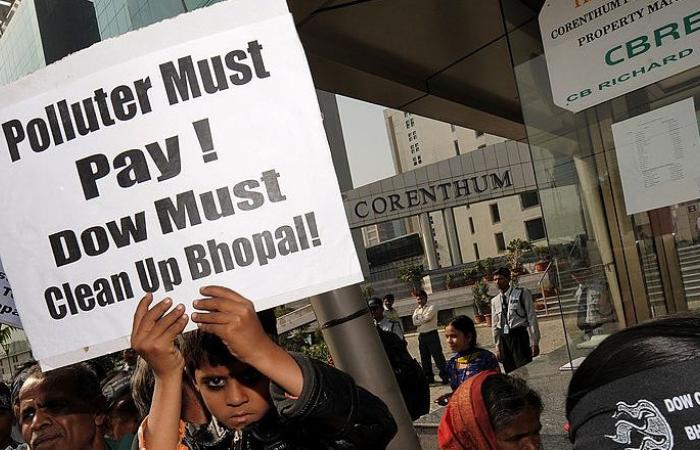
For four decades, environmental racism has enabled an inadequate and cruel response to the victims of the Bhopal toxic gas tragedy, Amnesty International said todayis December on the occasion of the 40eanniversary of one of the world's worst industrial disasters.
Forty years ago, a deadly gas leak occurred at a pesticide factory in the city of Bhopal, India, killing at least 22,000 people. Since then, Bhopal has been a “sacrifice zone” for the American chemical company Union Carbide Corporation (UCC), and its buyer, Dow Chemical (Dow), as well as for the American and Indian authorities; half a million people, over several generations, continue to suffer from the consequences of this catastrophe.
“Not much has changed in the last 40 years. Due to unequal power dynamics, victims, who mostly belong to low-income, marginalized and minority communities, do not get justice. At the same time, officials, particularly at large U.S.-based companies, continue to shamefully evade their obvious human rights responsibilities. The failure of Indian and American authorities to ensure accountability for this outrageous crime of corporate negligence is absolutely intolerable,” said Mark Dummett, Director of the Corporate Responsibility for Corporate Responsibility Program. human rights at Amnesty International.
Little has changed in the last 40 years… The failure of Indian and American authorities to ensure accountability for this outrageous crime of corporate negligence is absolutely intolerable.
Mark Dummett, Director of Corporate Responsibility for Human Rights at Amnesty International
“Victim associations and those who support them continue to lead a truly exemplary fight for justice, with legal action, scientific research and medical assistance in the absence of sufficient support from the State and companies concerned. This is a lesson in courage and resilience and we must pay tribute to these people on this anniversary. »
A “sacrifice zone”
Thousands of tons of toxic waste remain buried on and around the abandoned factory site, causing persistent and increasing water pollution. This clearly indicates that this is a 'sacrifice zone': an extremely polluted or contaminated area where the local population demonstrably suffers very serious health problems as a result.
Dow, one of the world's largest chemical companies, in 2001 purchased UCC, the U.S.-based company that owned the majority of the Bhopal plant at the time of the 1984 disaster. Dow took full control of UCC's assets, and therefore it should also have absorbed its liabilities. Instead, Dow has consistently distanced himself from any responsibility for the victims.
In 1989, UCC entered into a totally unfair and inadequate compensation agreement with the Indian government, which was accepted without consulting the victims of Bhopal. Additionally, lobbying and pressure work by the United States government allowed American individuals and companies responsible for the disaster to escape criminal justice.
Victims' associations and those who support them continue to wage a truly exemplary fight… This is a lesson in courage and resilience and we must pay tribute to these people on this anniversary.
Mark Dummett
A firmly established “environmental racism”
This year, Amnesty International published the report entitled Bhopal 40 Years of Injusticewhich gathers information highlighting environmental racism is well established, with systemic and intergenerational discrimination, which has allowed state actors and companies to evade their responsibilities and led to the absence of a comprehensive program of reparations. You can read the companies' responses in the appendix to the report.
The report explains that environmental racism covers numerous interrelated human rights violations that include the negative impact of environmental degradation on the rights to life, health, an adequate standard of living, education and other fundamental rights, violations of the right to a clean, healthy and sustainable environment, and violation of the right not to be discriminated against.
The indifference and contempt with which victims and their descendants have been treated since the gas leak, the lack of adequate and effective accountability from state actors and corporations for the gas leak and ongoing contamination , and the lack of a reparations program that adequately covers all past and current harms have been made possible by this entrenched environmental racism.
As a result, Amnesty International has called on shareholders to end their relationship with Dow and consider withdrawing their investment in the company if it does not take meaningful and prompt action to address the suffering through adequate compensation. adequately all victims, and assessing contamination and cleaning affected areas.
No amount of denial of responsibility can ever erase the horror of the tragedy that took place in Bhopal. This will only prolong the suffering of victims and prevent reparations.
Mark Dummett
Amnesty International is also calling on the Indian government to continue to seek legal redress from Dow on behalf of victims and to make up any shortfalls for those who continue to suffer or are wrongly denied reparations.
“Forty years after the Bhopal tragedy, the victims and their families must at least get justice. However, Dow continues to follow the same old tired rules established by the business world. No amount of denial of responsibility can ever erase the horror of the tragedy that took place in Bhopal. This will only prolong victims’ suffering and prevent reparations,” said Mark Dummett.
Additional information
On December 2, 1984, around midnight, a leak of around 40 tonnes of deadly methyl isocyanate (MIC) gas from the Bhopal pesticide factory, then owned by the US-based Union Carbide Corporation, killed thousands of people. who lived in informal housing located around the factory. It is estimated that more than 22,000 people have died prematurely as a direct result of exposure to this gas, and more people continue to lose their lives.
More than 500,000 people were injured or suffered permanent harm, including from the intergenerational effects of MIC exposure on reproductive health, and the contamination of water sources from chemicals left at the site.
Amnesty International also published reports on the occasion of the 20e et 30e anniversaries of the Bhopal disaster.





